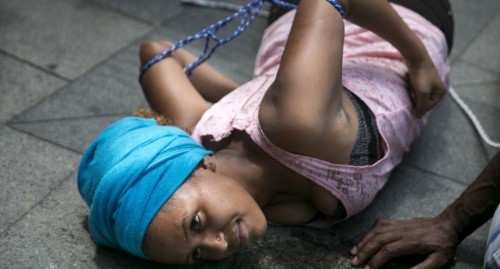UN estimates 300,000-400,000 enslaved in Eritrea
Ongoing human rights abuses in east African nation include rape, murder and torture, report alleges

the European Union delegation in Israel, in June 2015. Eritrea is believed to have a shoot-to-kill
policy to stop people from fleeing the country, according to the head of a UN inquiry. (Baz Ratner/Reuters)
UN rights investigators accused Eritrean leaders of crimes against humanity including torture, rape and murder on Wednesday and called on the Security Council to impose sanctions and refer the case to the International Criminal Court.
Atrocities — including an indefinite military national service program that amounted to mass enslavement — had been committed since the country's independence in 1991 and were ongoing, the UN Commission of Inquiry said.
"We probably think there are 300,000 to 400,000 people who have been enslaved," Mike Smith, the head of the inquiry, told a news conference.
He also said he believed Eritrea was still operating a shoot-to-kill policy on its borders to stop people fleeing from the country, many of them heading to Europe as refugees.
The report says "particular individuals, including officials at the highest levels of State, the ruling party — the People's Front for Democracy and Justice — and commanding officers bear responsibility for crimes against humanity and other gross human rights violations."
The inquiry said there had been no improvement since a year ago when it published a 484-page dossier describing extrajudicial killings, widespread torture, sexual slavery and enforced labour.

since Eritrea's independence in 1991. (Salvatore Di Nolfi/Keystone/Associated Press)
Inquiry head Mike Smith says atrocities including rape, murder and de facto enslavement have been committed since Eritrea's independence in 1991. (Salvatore Di Nolfi/Keystone/Associated Press)
'Facade of calm'
Visitors to the country should not be fooled by the "general sense of calm and order" in the capital Asmara, because abuses were carried out in military training camps and detention centres, the report said.
"The facade of calm and normality that is apparent to the occasional visitor to the country, and others confined to sections of the capital, belies the consistent patterns of serious human rights violations," it added.
Eritrea's government did not allow the inquiry team to visit the country, although its diplomats met the investigators at the UN headquarters in New York.
Last year the three-strong inquiry team, led by Smith, an Australian diplomat and counter-terrorism expert, did not have a mandate to look into "international crimes," so the previous report said only that crimes against humanity may have been committed, without apportioning blame.
'Groundless accusations'
In the past year, the inquiry has received almost 45,000 written submissions, almost all group letters and petitions criticizing the first report, the direct result of a government campaign to discredit the inquiry, the report said.
Some signatories contacted by the inquiry said they had been coerced or their signatures had been forged and they were unaware of the letters, the report added.
Eritrea's government said on Wednesday it rejected what it called the "politically motivated and groundless accusations."
The report is "an unwarranted attack not only against Eritrea, but also Africa and developing nations." said presidential adviser Yemane Ghebreab in a statement.
The east African nation has routinely dismissed reports by UN bodies and campaign groups of rights violations in the past.


![[AIM] Asmarino Independent Media](/images/logo/ailogo.png)